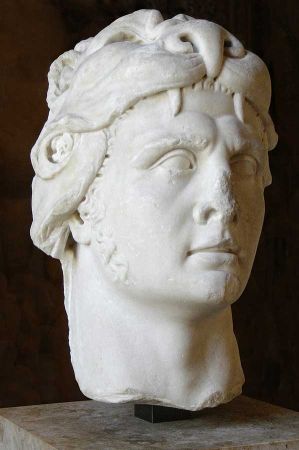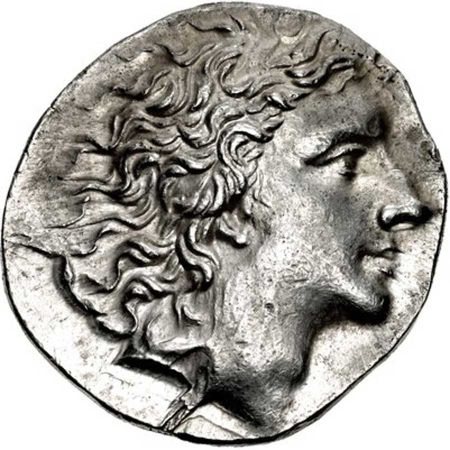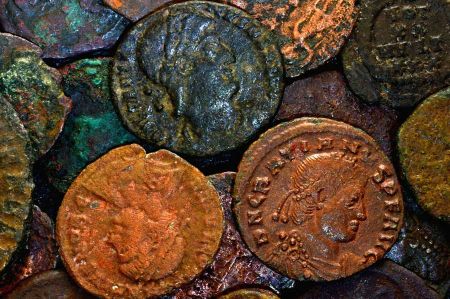Mithridates VI - powerful king of Pontus
- Written by Portal Editor
Mithridates (132 BC - 63 BC), known as Eupator Dionysus, went down in history as one of the great opponents of the Romans' attempts at expansion.
Little is known about his origins and his youth, which of course leaves room for speculation and myths.
The story tells that Mithridates spent about 7 years of his youth in exile because his mother sought for his life. How and why he was able to come to power is not exactly recorded. In any case, after several years of joint reign with his brother Chrestos, Mithridates was able to consolidate his own position so that he got rid of his brother and his mother in a way that was quite common at the time by having them murdered.
Autonomous ruler Mithridates - up to the Crimea
 Now as the sole ruler, Mithridates began to expand his areas of power by first incorporating the Greek-populated areas in the Crimea. He often appeared here initially as a protector of the steppe nomads, whose territories he then integrated into his kingdom. In this way Mithridates was able to strengthen and expand his kingdom of Pontus so that it became the largest and most influential empire in Asia Minor in the 1st century BC.
Now as the sole ruler, Mithridates began to expand his areas of power by first incorporating the Greek-populated areas in the Crimea. He often appeared here initially as a protector of the steppe nomads, whose territories he then integrated into his kingdom. In this way Mithridates was able to strengthen and expand his kingdom of Pontus so that it became the largest and most influential empire in Asia Minor in the 1st century BC.
As so often in history, that wasn't enough. His thirst for expansion quickly expanded to areas in Asia Minor, with which he took on the also expanding Romans. In the first years of the expansion of their area of power, the governors of Rome in particular simply exploited the province of Asia by constantly collecting new taxes. The people living here did not want to and could not raise taxes, which is why there were frequent uprisings among the population. As a skilful rhetorician, Mithridates was able to use his hatred of the Romans for his own desire for expansion and won many followers with his promise of freedom for the people. In this way Mithridates managed to expand his own sphere of influence. In addition, Mithridates was quite stately in appearance, which he also demonstrated every now and then: he was able to cover huge distances by horse in a short time, which earned him admiration and all sorts of fantasy stories due to his physical strength in the population.
Mithridates had already been able to expand his empire to Cappadocia when he met the Roman governor Sulla of Cilicia. This was powerful enough to drive Mithridates out of Cappadocia, whereupon the kingdom of Pontus allied with the kingdom of Armenia, Mithridates' son-in-law, Tigranes II. Together with him, Mithridates was able to bring large parts of Asia Minor, the Aegean Sea and Greece under his control until he came to the city of Kyzikos, which is now called Baliz and lies on the Marmara Sea near Erdek. Despite extensive sieges and the alleged murder of around 80,000 Romans and Italians, settlers who originally came from northern Europe, the so-called Vespers of Ephesus in 88 BC, Mithridates could not take the city.
Vespers of Ephesus - Governor Sulla as opponent
 With the help of Rome, the governor Sulla had already been able to raise an impressive army the year before, but it was only able to achieve moderate success against Mithridates. This first Mithridatic war began in 89 BC and lasted five years during which even Ephesus defected to Mithridates. With the killing of this huge number of Romans and Italians during the Vespers of Ephesus, Mithridates wanted to eliminate all opposition in the country and at the same time take over their possessions as booty. Another point for the Mithridates-ordered pogrom of the assassination of all Italians of whatever age, gender or status on a certain day was certainly also the hatred of the Roman tax collectors, who had already exploited the population for more then 40 years. The hatred was so great that even burying the dead was made a punishable offense.
With the help of Rome, the governor Sulla had already been able to raise an impressive army the year before, but it was only able to achieve moderate success against Mithridates. This first Mithridatic war began in 89 BC and lasted five years during which even Ephesus defected to Mithridates. With the killing of this huge number of Romans and Italians during the Vespers of Ephesus, Mithridates wanted to eliminate all opposition in the country and at the same time take over their possessions as booty. Another point for the Mithridates-ordered pogrom of the assassination of all Italians of whatever age, gender or status on a certain day was certainly also the hatred of the Roman tax collectors, who had already exploited the population for more then 40 years. The hatred was so great that even burying the dead was made a punishable offense.
It was not until 85 BC that the first Mithridatic War could be ended in the peace treaty of Dardanos, as a result of which the king of Pontus lost all areas of influence to the Romans except for the southern coast of the Black Sea. For Ephesus, this meant a criminal court in Rome, whereby large areas were lost through pillage and transfer to the Romans and their heads were executed. Sulla subsequently set up his winter quarters in Ephesus.
Just four years later there were uprisings again, which were based on the high tribute payments to Rome and which were used again by Mithridates. The Lucius Licinius Murena appointed by Sulla could only appease the advancing Mithridates by losing territory and end the war in 81 BC.
In the third Mithridatic War of the years 74 - 63 BC, the new Roman leader Lucullus was able to achieve great successes against Mithridates and Tigranes, but was then replaced by Pompeius, which extended the course of the war. It was not until 63 BC that Mithridates was finally defeated and, after the peace negotiations that resulted in a political reorganization of Asia Minor, banished to the Crimea. Despite his family's negotiations with Rome, Mithridates repeatedly tried new attacks against Asia Minor, whereupon he was replaced by his son. According to legend, Mithradates is said to have tried to kill himself with poison, but since he was already immune through controlled ingestion of poisons, this too failed. In the same year Mithradates was stabbed to death by his own followers at Pantikapaion Castle.
Please also read:
The Saale Bridge in Bad Kösen - not just a monument
Outdoor parks, gardens and open spaces in Norwich
